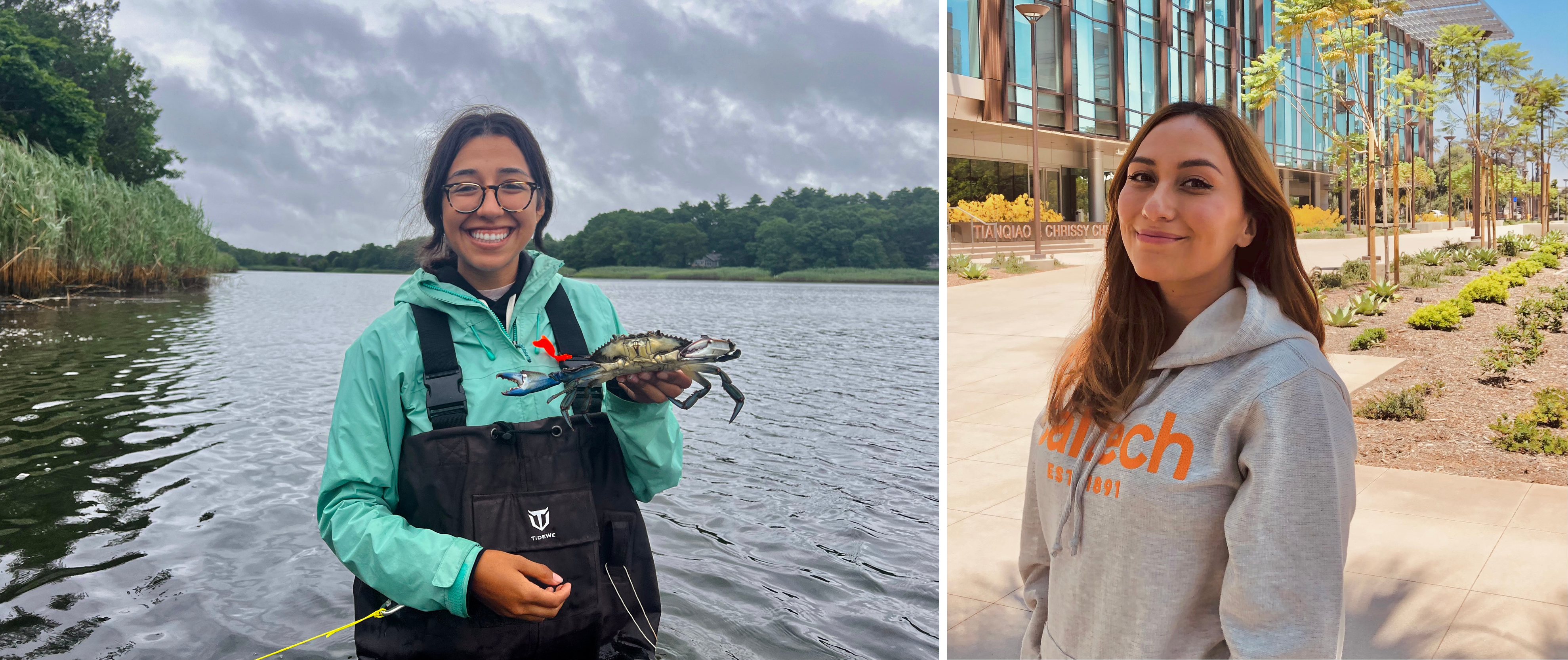Massachusetts Sea Grant Fellows Focus in on Blue Crabs and Coastal Jellyfish

MIT Sea Grant and WHOI Sea Grant jointly announce two new Massachusetts Sea Grant Graduate Research Fellows
In 2021, MIT Sea Grant and Woods Hole Oceanographic Institution (WHOI) Sea Grant announced a new fellowship program to support Massachusetts graduate students engaging in coastal and marine research. MIT Sea Grant and WHOI Sea Grant are welcoming two new fellows this fall: Bridgett Hunt (pictured above, right), who is starting her PhD with the MIT-WHOI Joint Program, and Neida Villanueva Galarza (pictured above, left), who is beginning her PhD at Northeastern University.
“MIT Sea Grant and WHOI Sea Grant launched the fellowship, in part, to bring new and diverse perspectives into environmental fields,” said MIT Sea Grant Director Michael Triantafyllou. “Supporting graduate students who may not otherwise have the opportunity to attend a masters or Ph.D. program in the sciences is aligned to Sea Grant’s commitment to build an inclusive marine science community.”
Meet the Fellows
Bridgett Hunt is a graduate student in the MIT-WHOI Joint Program, studying Biological Oceanography. Over the past several years, she has helped establish the jellyfish species Clytia hemisphaerica as a model organism for neuroscience research, a journey she began as a research technician at the California Institute of Technology. Bridgett holds a B.S. in Biochemistry from California State University, Fullerton and a M.S. in Biological Sciences from California State Polytechnic University, Pomona. Currently, she is working in the Weissbourd Lab within the MIT Department of Biology and the Picower Institute for Learning and Memory with Assistant Professor Brady Weissbourd, studying the neural control of behavior involved in marine larval settlement using Clytia.
Through her project, “Deconstruction of larval settlement behavior and neural circuitry in the coastal jellyfish, Clytia Hemisphaerica”, Bridgett seeks to understand how different environmental cues impact Clytia’s larval settlement behavior, and to identify the specialized neural circuitry involved in this process. Understanding the neural activity associated with settlement could inform the development of new technology to enhance or reduce larval settlement of various species, supporting habitat restoration and conservation efforts. As a prevalent species worldwide, insights into Clytia’s larval settlement behavior could provide valuable information about ecosystem health and biodiversity amidst climate change.
Neida Villanueva Galarza graduated with a B.S. in Environmental Science from Northeastern University in 2023. As an undergraduate, she joined the Grabowski Lab with the Marine Science Center, part of the Department of Marine and Environmental Sciences, where she became involved in projects ranging from social science to fisheries ecology and geospatial analysis. She also honed in on her research interests, aiming to explore species interactions with a focus on underscoring the importance of incorporating social science and local knowledge into ecological research.
Through her project, “Exploring density and trait mediated impacts of range expanding species in the Gulf of Maine,” Neida will examine the relative importance of density vs. trait-mediated effects of the range expansion of blue crabs (Callinectes sapidus) on coastal food webs in the Gulf of Maine. Blue crabs are voracious predators that are expanding their range northward, facilitating novel interactions with many different species including established invasives such as green crabs (Carcinus maenas) and Asian shore crabs (Hemigrapsus sanguineus). Neida’s goal is to better understand how blue crabs will impact community structure, which will help inform how to manage their impacts on coastal ecosystems and native fisheries in the Gulf of Maine as blue crabs become more prevalent.
The Fellowship
The focus of the MA Sea Grant Graduate Research Fellowship is to support new coastal and marine research by students who may not otherwise have the opportunity to attend graduate school, as well as professional growth for the fellows. Fellows work directly with Sea Grant liaisons and Professional Development Mentors to hone their communication, project management, and research skills. As part of their research, fellows also share results with relevant communities and constituents, a key focus of all Sea Grant programs.
The first two Massachusetts Sea Grant Graduate Research Fellows, Nicole Vandale (Northeastern University) and Sarah Guitart (University of Massachusetts Amherst) will be completing their two-year fellowships at the end of August. Vandale’s research focuses on microplastics, and Guitart studies seabird diets.
“This collaboration between the MIT and WHOI Sea Grant programs exemplifies the power of working together to support Massachusetts coastal communities through research and education,” said WHOI Sea Grant Director Matt Charette. “By joining forces, the fellowship offers the graduate students a broader scope of professional development opportunities. As the fellows pursue studies that fill information gaps and develop innovative solutions to pressing coastal issues, they will be encouraged to apply their research to positively impact coastal communities.”
>>More about the 2022-2024 Fellows
WHOI SEA GRANT — The WHOI Sea Grant program, based at the Woods Hole Oceanographic Institution (WHOI), supports research, education, and extension projects that encourage environmental stewardship, long-term economic development, and responsible use of the nation’s coastal and ocean resources. It is part of the National Sea Grant College Program of the National Oceanic and Atmospheric Administration, a network of 34 individual programs located in each of the coastal and Great Lakes states. Together, these programs form a national network of over 300 participating institutions involving more than 3,000 scientists, engineers, educators, students, and outreach experts.
MIT SEA GRANT — MIT Sea Grant is a Federal-Institute partnership that promotes the conservation and sustainable development of coastal and marine resources through research, education, and outreach. Bringing the engineering and research core of the Massachusetts Institute of Technology to bear on ocean-related challenges, MIT Sea Grant engages with communities and stakeholders to enable scientific investigation, develop technology, and support solutions surrounding ecosystem health and human use of these environments in collaboration with industry, state and federal partners.



